
|
|
Abstract: Brief reports on various topics, mostly related to politics or then-current news, published in 5 issues of dialogue magazine. Notes: The following items, which were originally published in separate issues, have been combined here for ease of filing. See also list of dialogue articles or image scans. |
SHORT TAKES
Dialogue 1986, Vol. 1, No. 2, p. 7
More than 6,500 scientists, including a majority of professors in the nation’s top 20 university physics departments, have declared themselves opposed to President Reagan’s Strategic Defense Initiative and have pledged not to accept any “Star Wars” research funds.
The scientists, including 15 Nobel laureates, have signed a “pledge of non-participation” that calls the Strategic Defense Initiative “ill-conceived and dangerous.” The pledge maintains that no weapons system can render nuclear missiles “impotent and obsolete” as Reagan has called for, and that further pursuit of a missile defense is likely to spur an arms race on Earth and in space.
“What we are witnessing is the third major uprising of the nation’s scientists against an element of U.S. weapons policy,” Rep. George E. Brown Jr. (D-Colton) said in response to the pledge. He said that the only precedents are scientific opposition to nuclear tests in the atmosphere in the late 1950s and to development of anti-ballistic missile systems 10 years later.
Brown said the opposition to a space-based missile defense shows that Lt. Gen. James A. Abrahamson, “Star Wars” director, was incorrect last fall when he said that there were “only a few die-hards left, sincere die-hards, but only a very few” opposing the program.
The church put the theologian under “penitential silence” last May for his writings, particularly the 1981 book, “Church: Charisma and Power,” in which he criticized the church for “elitism” and for not taking a stronger stand in defense of human rights.
Boff is considered the leading exponent of liberation theology, which links spiritual freedom to economic and social issues. The Vatican objects to what it views as elements of Marxist class-struggle analysis and justifications for violent methods in some versions of the theology.
Boff says he is not a Marxist, but believes the church should actively seek to end poverty and social injustice.
When these findings were published in the Egyptian press, the Voice of Israel radio demanded reparations for the slave labor the Pharaoh’s pressed on the Israelites.
SHORT TAKES
Dialogue 1986, Vol. 1, No. 3, p. 9
The difficulty of resocializing the Ugandan children who fought in the most recent civil war now confronts both the new government that deployed them and the international relief agencies that decried their use. A report in the pro-government Kenya Times of Nairobi says that many children — some only 10 years old — joined the National Resistance Army (NRA) after their parents were killed by the country’s former ruling forces. “Those who joined the [NRA] fought gallantly. They went on to endear themselves to the public for their discipline,” which the previous army notoriously lacked.
With the fighting largely over, some children are being reunited with surviving parents or other family members. “The Roman Catholic Secretariat in Kampala has been paying school fees and assisting the mothers or [other] relatives...in finding food. Family links have been preserved.” But Ugandans are learning that regular schools may not be appropriate for the “kid soldiers.” While they are the same age as their classmates, “they have had experiences [that] should not be [communicated] to other children.” Some former fighters arrived at school armed.
Nearly 95 percent of Brazil’s tillable land is controlled by less than 5 percent of the population. President Jose Sarney, pressed by Brazil’s activist Catholic Church, initiated a land reform program last year to distribute 172,000 square miles of land among 1.4 million peasant families.
Landowners have responded by creating private militias to intimidate the peasants, according to the Catholic pastoral Commission for Land. The Commission documented 222 deaths — including one priest and several lay church workers — in 1985 land disputes. Thousands of state police officers have left public service for more highly paid jobs in private militias run by the landowners, according to the commission.
In 1986 more than 100 peasants have been killed, including six lay church workers. In May the Minister of Land Reform resigned from the Sarney government following the assassination of a Catholic priest, Josimo Tavares, who was coordinator of a local Pastoral Commission for Land group.
On July 10, President Sarney met with Pope John Paul II in Rome to seek his help in easing tensions between the Brazilian bishops and the government over the slow pace of the land reform program. The bishops charged that the government is caving in to the powerful landowners by delaying land distribution.
In its annual survey, the London-based human rights group assailed what it said was the continued, widespread use of arbitrary arrests to suppress political dissent.
However, the group said it was encouraged by the emergence of more than 1,000 rights groups in recent years. “There is more pressure in governments and more signs that governments are reacting to that pressure,” a spokesman said.
SHORT TAKES
Dialogue 1987, Vol. 1, No 4, p. 8
THE OMINOUS COLOR OF TOXIC DUMPING
Blacks and Hispanics are more likely to live near toxic-waste sites, according to a report released in April by the United Church of Christ’s Commission on Racial Justice.
The 18-month study found that three of the five largest toxic-waste landfills in the U.S. are located in southeastern communities that are more than 75 percent black. Nationally, communities with one hazardous waste facility have twice the percentage of minorities as those with none; the percentage triples in communities with two or more waste sites. The commission also found that three out of five blacks and Hispanics live in communities that have illegal or abandoned dumps.
The report suggests that more attention be given to the possible connection between recently documented health problems among minorities and the presence of toxic-waste sites in their communities.
Minority community activists, the commission reports, often find the government unresponsive, if not downright obstructionist, when they attempt to obtain information on the toxics in their backyards. The report charges that the environmental movement, which it characterizes as historically a middle- and upper-class phenomenon, has been unresponsive to environmental issues affecting minorities. The commission urged action at all levels, from the creation of an EPA office of racial and ethnic affairs to grassroots organizing around environmental issues by churches and neighborhood groups.
“Brazil has no immediately apparent racial problems, no apartheid laws, no Ku Klux Klan,” writes Dorrit Saitz from Sao Paulo in the Labor daily Arbeiderbladet of Oslo. “Most Brazilians have European, African, Indian, Arab, and perhaps Asian blood in their veins.” Yet the society is driven by a subtle racism: “Nine-tenths of Brazil’s blacks are poor.”
In the conservative O Globo of Rio de Janeiro, Carlos A. Hasanbalg agrees. “On the eve of the centennial of slavery’s abolition in Brazil,” he writes, “blacks continue to be concentrated on the lowest rungs of society. In 1980, the proportion of blacks with no schooling or less than one year of school was twice that for whites. Blacks’ participation in the economy is characterized by disproportionate concentration in unskilled jobs, the worst paid jobs....Statistics show that whites make approximately twice what blacks do.” He continues: “The time when we could speak indulgently about the harmonious nature of race relations in Brazil is over. The question is when the issue of race will become part of our national agenda.”
The Presbyterian Church has removed 22 of this country’s most profitable corporations from its investment portfolios because of their involvement in the manufacture of nuclear weapons or other military paraphernalia.
At stake immediately is $2.4 billion in funds held nationally by the Presbyterian Board of Pensions and the Presbyterian Foundation. Also, the church’s 81 Presbyterian-related institutions of higher education and more than 200 regional presbyteries and synods — with investment funds totaling more than $1 billion — are being strongly encouraged to follow the national criteria.
Corporations that have been dropped include: General Dynamics, General Electric, Boeing, McDonnell Douglass, Lockheed, Raytheon, Rockwell International, and Grumman.
Walter Smith, an operator of Pacific Coast Timber Harvesting, as quoted in The New Settler: “It is natural for man to manipulate his environment and ruin it. And it may be natural that we are going to go through the process of ruining the land and we are going to die and there is going to be nothing left. That will be the end of it.”
An American high school student who attended a Soviet school for three weeks as quoted in The New York Times: “American teen-agers are more socially advanced. For instance, in their free time Soviets would rather read a book or walk in the park or play the piano. American teen-agers would probably go out and watch TV, go to the movies, or something more actively inclined.”
SHORT TAKES
Dialogue 1987 Vol. 2, No. 1, pp. 8-9
CHRISTIAN — BAHÁ'Í DIALOGUE
A conference on the “Relationship between the Bahá'í Faith and Christianity” was held at Harvard Divinity School December 4-5. Dr. Charles Courtney, professor of the philosophy of religion at Drew University in Madison, N.J., set the tone of the conference with his talk “Can Inter-religious Relations be a No-Trump Game?” As a result of his talk, metaphors from card games became a common part of the discussion at the conference. During discussion, Dr. Peter Wyatt, pastor at Melrose United Church in Hamilton, Ontario, and representative of the United Church of Canada, spoke of the importance of each religion showing the others its “hand” of cards; he also spoke of religious “discarding” cards that were harmful or not useful and of religions exchanging cards that had proved useful to the others.
Robert Stockman’s “The Challenges of Bahá'í — Christian Dialogue” prompted a stimulating discussion of the basic teachings of the Bahá'í Faith. Dr. Wyatt asked about the Bahá'í concept of authority and Dr. Courtney asked for examples of how the Bahá'í community’s understanding of its religion’s teachings had changed. Many of the questions came from a liberal Protestant perspective.
Friday evening, a screening of the film “The Mission” raised fascinating questions about the interaction between church and state. Saturday morning, Dr. Peter Wyatt spoke on “Toward an Inclusive Christology.” He outlined the basic problem facing Christian theology: how to create a Christology that remained faithful to the Christian tradition, yet was not exclusive worship or a prop for Christofascism. Particularly interesting was his interpretation of the New Testament verse “I am the way, the truth, and the light; no one cometh to the Father except by me” as “love talk” that was not meant to be exclusive. Dr. Ann Schoonmaker’s “Generic Theology: Investigating the reality behind Religious Pluralism” analyzed the audiences to which ‘Abdu'l-Bahá explained the Faith, and outlined the approach that he took to each.
The first section of the conference was opened by a prayer delivered by Dr. Wyatt, and the last section opened with a Bahá'í prayer. The atmosphere of the conference throughout was one of warmth, openness, and eagerness to communicate. The New England Committee of the Association for Bahá'í Studies sponsored the conference and wants to plan a second conference. (From The Boston Area Bahá'í Report)
The independent Statesman of New Delhi praises moves to outlaw amniocentesis in private Indian health clinics, where the test is routinely used to screen and then abort female fetuses. One study shows that 99.9 percent of fetuses aborted after such tests are female. Calling such a ban “a commendable and socially progressive step,” the paper condemns “the practice of systematically destroying one gender.
The annual “alternative Nobel Prizes,” known as the Right Livelihood Awards, were presented in the Swedish Parliament December 9, 1987. Among the winners was anti-hunger writer and activist Francis Moore Lappé of the Food First Institute.
Begun in 1980, the Right Livelihood Awards focus on work toward “practical, replicable solutions to the real problems” facing humanity. Lappé and the San Francisco-based Food First Institute were cited for “revealing the political and economic cause of world hunger” and “showing how ordinary citizens” can work to overcome world hunger.
Other 1987 winners included the Chipko environmental movement in India and European peace activists Johann Galtung and Hans-Peter Durr.
White supremacist Dwight McCarthy said his “Aryan Nations Hour” radio show was canceled because of pressure from a “liberal-Marxist-homosexual-Zionist coalition.”
Jesus of Nazareth was a master at using images and parables to convey truths to his friends. But what went over well in the Middle East doesn’t necessarily play in northern Canada. Bible translators who are trying to serve the native people there are having a tough time in a land without mustard trees, sheep, or wheat, according to report in Religious News service.
One translator, groping for a word to describe “joy,” was struck by the excitement of sled dogs at feeding time and decided to borrow the native word that described it. Translated into English, it came out, “When the disciples saw Jesus, they wagged their tails.”
Another translator, looking for a way to describe a person of high importance, discovered that the most important person in many villages was the man who owned the largest boat. For some Canadian natives, the Lord’s Prayer now begins with the phrase “Our boat owner, who lives in heaven....”
According to Mother Jones magazine, political activism and financial stability are no longer mutually exclusive goals. To encourage more students to make a career out of activism, California peacenik Chris Brown and others founded the Union of Peace Professionals.
A national association, the union sets employment standards and offers benefits like health care, training sessions, and a professional journal for those whose full-time jobs are devoted to a cause. Peace pros might work to promote antinuclear groups or to end violence in Central America, for example. They lobby, educate the public, demonstrate, and raise funds — sometimes to pay their own salaries.
The average income for a salaried peace worker is about $1,000 per month, according to Brown. “It’s nothing anybody could get rich on, but it’s possible for you to make a living,” said Brown.
Ruth Lindahl, a member of the Union of Peace Professionals, earns $1,200 a month as state coordinator for the Tennessee Peace and Disarmament Campaign. Her job requires her to do everything from organizing demonstrations and dealing with volunteers to typing and emptying wastebaskets. “The union has made my life easier,” she says. “I could never have taken this job if it weren’t for the union-supplied health benefits. Because of that I can do what means most to me on a full-time basis.”
For information on career opportunities in the peace movement and on the Union of Peace Professionals, contact Brown at 7250 W. Franklin #112, Los Angeles, CA 90046, or call (213) 938-2344.
Headline from the Spokane Chronicle: PEACE MAY NOT BE BEST FOR BOEING; UPCOMING TREATY MAY LEAD TO CUTS IN DEFENSE BUDGET
SHORT TAKES
Dialogue 1988, Vol. 2, Nos. 2 & 3, pp. 6-7
A WOMAN’S LABOR
The wage gap between women and men in the United States is narrowing, but an increasing percentage of U.S. poor are women, according to a recent Rand Corp, study. The study found that from 1980 to 1986, wages for all working women increased from 60% to 65% of men’s wages, and in the age range from 20 to 24, women’s wages increased from 78% of men’s wages to 86%. And 25% of all new graduates in law, medicine, and business are women compared with only 5% two decades ago.
The United Nations Environmental Programme is sponsoring an “Environment Sabbath” for the second year in its continuing effort to involve many faith communities in raising awareness of our responsibilities to the earth’s preservation. The Sabbath will be observed this year from June 2-4; World Environmental Day is June 5. The program asks religious leaders and communities to reflect on their faith and rediscover the wisdom and guidance that will inspire creative action in saving and restoring our world. The Environmental Programme assists these efforts by making available promotion materials and some leadership training programs. For more information, contact: United Nations Environmental Programme, Rm. DC2-0803, United Nations, New York, N.Y. 10017; (212) 754-8139.
Many U.S. newspapers have affirmative action policies when it comes to hiring, but Gannett, the nation’s largest newspaper chain, also has a kind of affirmative action policy regarding what it prints. According to a report in the Columbia Journalism Review, reporters and photographers are strongly encouraged to interview and take pictures of members of minority groups for all kinds of stories, not just those about racial issues, and to find stories and pictures that present minorities in a positive light. Some Gannett papers keep a minority source list in the newsroom; others have minority affairs committees that review their papers periodically and suggest ways to implement the policy.
Gannett executives describe their “mainstreaming” policy as an effort to reflect the country’s racial and ethnic diversity, to make minority groups more visible in the chain’s newspapers and to get away from what one official calls “the insidious stereotyping that tends to take place by white male managers.”
The government of Costa Rica and the U.N. Commission on Environment and Development are cosponsoring a world conference to develop a “Universal Charter of Human Responsibilities for Peace and Sustainability” in San Jose, Costa Rica, June 25-30.
Workshop topics include peace education and human rights, environment and sustainability, gender relations and community, religion and spirituality, family, arts, communications, and security and conflict resolution. Keynote speakers will be Dr. Oscar Arias, Nobel Peace Prize recipient and Costa Rican president, and the Dalai Lama of Tibet. For more information contact: University for Peace, PO Box 199-1250, Escazu, Costa Rica.
At the beginning of 1989, at least 32 wars were fought around the world. According to a study done by the Santa Barbara Resource Center, 25 of the 32 wars stem from racial, religious, or ethnic conflicts. With the exceptions of Northern Ireland and the Soviet provinces of Armenia and Azerbaijan, the majority of wars are being fought in Asia, Africa, Latin America, and the Middle East.
The Study also classified the conflicts according to those which are civil wars, as in Sri Lanka; civil wars with international implications, such as the Iran-Iraq war; religious or ethnic wars, such as with the Sikhs in India; wars in which the United Nations is involved, as in the Morocco-Western Sahara war; and wars in which a superpower is involved, as with the United States in Nicaragua.
The study also provides information on the total number of deaths since a conflict began. For instance, there have been 1.2 million deaths in the war between China and Tibet since it began in 1956; 213,000 deaths in the war in Angola since 1975; and 138,000 deaths in Guatemala since civil war broke out there in 1966.
In a message to the Roman Catholic bishops of Nigeria, Nigerian President Ibrahim Babangida assured them that Islam is not to become the state religion of Nigeria. Some Christians have worried that in the constitutional revision now being prepared, Islam will be given some sort of official status. Though the figures are disputed, the number of Christians and Muslims among the 100 million Nigerians is roughly equal.
The International Herald Tribune reports that “a surge of spiritual fervor in Southeast Asia is fracturing long-established religions, and creating conditions for conflict, government officials and religious leaders warn.” In multi-racial Malaysia and Singapore, it notes, “one trend that worries officials...is that ethnic Chinese are being attracted in increasing numbers to Christianity while Malays adhere to Islam.” A government survey shows that the proportion of Christians among the 2.6 million Singaporans has risen from 10% to 18% since 1980. Singapore Prime Minister Lee Kuan Yew notes a trend “more towards intensely held exclusive beliefs than towards tolerant co-existence.” He said his government is considering setting up a council to promote inter-faith harmony.
The January/February 1989 issue of Bahá'í Canada announced a major change in the publication’s editorial direction: “Over the next few months the format and contents of Bahá'í Canada will undergo a gradual change so that it will fulfill the Six Year Plan goal to produce a magazine suitable for the public.” Each issue of Bahá'í Canada will have a focus issue and the magazine “will attempt to convey the Bahá'í approach to contemporary challenges.” The editors hope to have a distribution of 10,000 friends of the Bahá Faith as well as reaching local, provincial, and national leaders of Canadian society.
The severe flooding that has left over 20 million people homeless in Bangladesh is largely the result of deforestation in the Himalayas of Nepal and India.
Bangladesh is a low-lying country through which flow three major rivers: the Ganges, Brahmaputra, and Meghna, which normally flood during the annual monsoon rains. The Himalayan region was at one time 60% forested; the figure now is down to 15%. This deforestation has led to the devastating flooding in Bangladesh this year, and which is expected to continue in the future.
Experts say one solution is to build a series of huge dams in Nepal, China, and India. Another solution already underway is reforestation, which has been getting attention in India. Dredging of the heavily silted rivers will also help to keep the flood waters in their channels.
Short Takes, from dialogue 1:2, p. 7 (1986) |
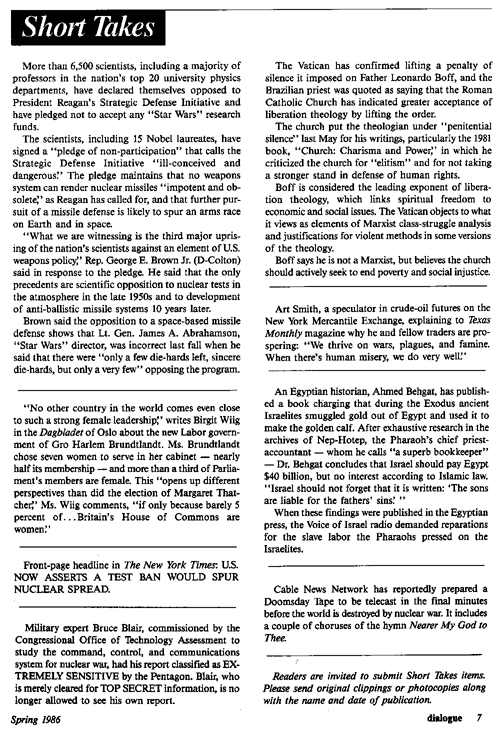 click for larger image |
Short Takes, from dialogue 1:3, p. 9 (1986) |
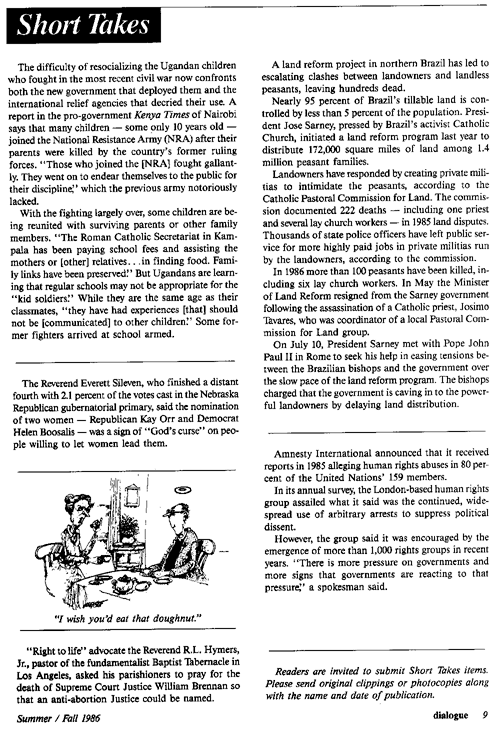 click for larger image |
Short Takes, from dialogue 1:4, p. 8 (1987) |
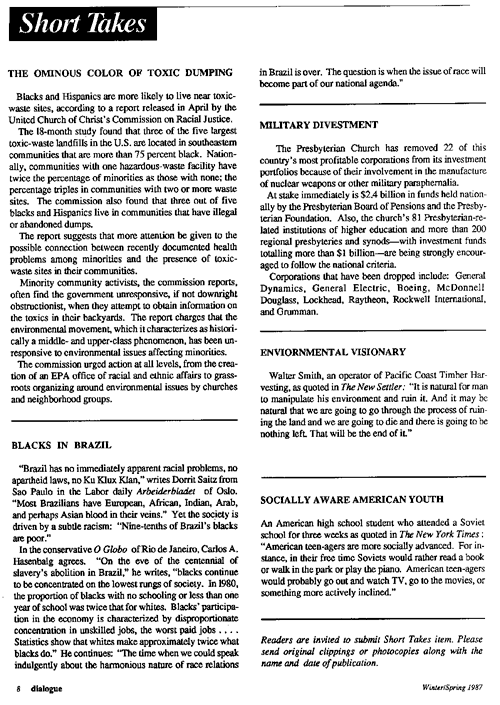 click for larger image |
Short Takes, from dialogue 2:1, pp. 8-9 (1987) |
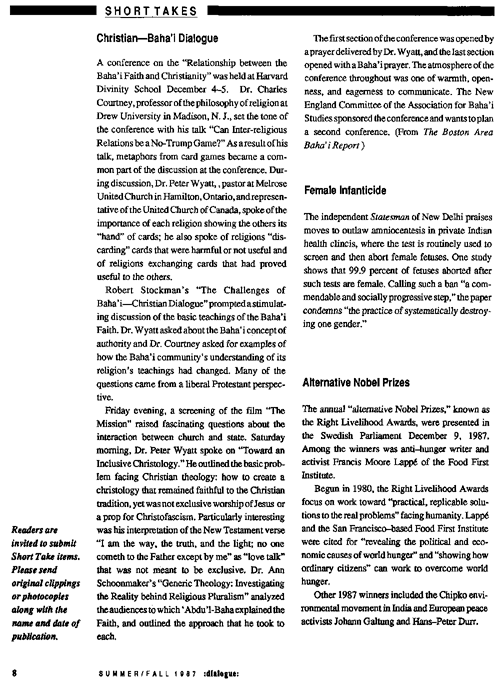 click for larger image |
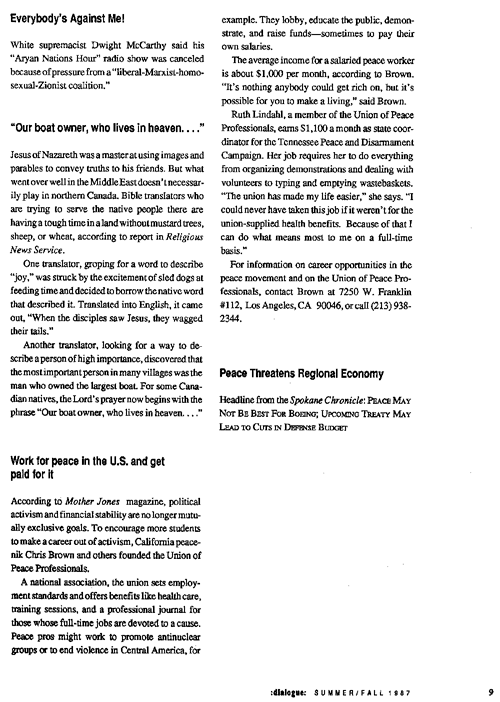 click for larger image |
Short Takes, from dialogue 2:2-3, pp. 6-7 (1986) |
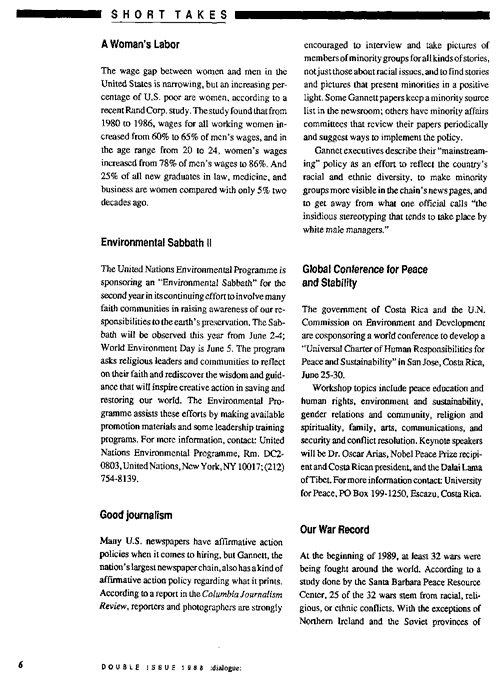 click for larger image |
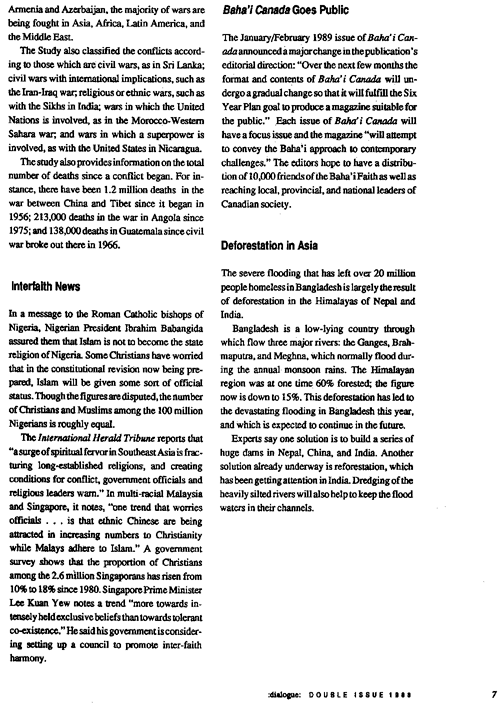 click for larger image |
|
|